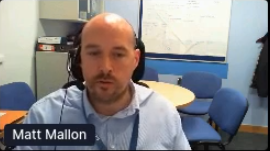HFMA 2020: patient improvements and efficiencies made
In the opening session of the association’s annual conference, which is being held virtually this year, the Northern Health and Social Care Trust detailed how it tackled capacity shortfalls in the services.
Petra Corr, the trust’s director of mental health, disability, and community wellbeing, said the focus was on helping senior managers to boost service capacity. ‘There was a lack of informed decision-making and accessible data to allow senior managers to maximise service delivery. We had a limited overview of capacity and demand.’
Changes meant moving away from a culture that had built up over many years, such as treating each case equally, when the reality is more complex. ‘Our case loads were treated equally, with each case taking the same length of time, when to any of us who have worked in mental health services – and across health and social care – that’s not the case.’
Muhammad Haji, director of marketing and sales at Meridian Productivity Ltd, which supported the trust in improving both mental health and imaging services, said there were potential gains to be made. ‘There were opportunities to increase the direct care time for the service users and to increase capacity to provide care.’
By the end of the project, mental health staff time spent directly with clients increased from 24% to 36%. David McMullan, the trust’s assistant director of finance, said the trajectory, agreed with staff is to aim for 49%. Capacity increased and contacts per whole-time equivalent rose. Overall, actual savings during the project and potential savings opportunities added up to £1.6m on a baseline budget of just over £6m.
Matt Mallon, radiology manager at the trust, said the pandemic had reduced capacity significantly, particularly in its primary care sites. Historically, patients were allocated to the radiologists working on the day of their appointment.
But it has now introduced a ‘push’ allocation system, which has been co-created with staff. A group of medical secretaries, trained on the system, allocate patients to radiologists according to their specialism and interests. ‘This has introduced a little bit of nuance, so the right radiologist resource gives a particular type of examination at the right time,’ Mr Mallon said.
This increased the quality of the radiologists’ reports, he added.
Mr McMullan said the imaging budget is just over £16m, but with the service activity greatly supressed by Covid, the trust began to define potential savings in terms of recovery value. Annualised, the recovery value achieved came to £2.3m, with further potential productivity gains (costs avoided) in scanning of almost £800,000 and £500,000 in reporting – giving total potential savings of £3.6m.
In both schemes cashable and non-cashable efficiencies could be made, he said. He added: ‘In mental health teams, if there is the projected significant increase in demand as a result of Covid, there is a greater opportunity to reconfigure.’
While the projects started before the Covid-19 outbreak, the virus affected progress on the improvement schemes. For example, mental health staff working from home, shielding or self-isolating had limited access to the trust’s IT systems, making it more difficult to make headway.
Related content
The Institute’s annual costing conference provides the NHS with the latest developments and guidance in NHS costing.
The value masterclass shares examples of organisations and systems that have pursued a value-driven approach and the results they have achieved.